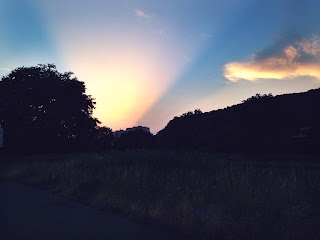this june i started a masters degree in sustainable development at soas, which so far i greatly enjoy. yesterday i was reading about the topic of biodiversity loss. hunting, over harvesting, uprooting, pollution and other factors (mostly originating from human activity) are resulting in an incredibly fast reduction of biodiversity. e.o. wilson, an american biologist writes:
"even with cautious parameters, selected in a biased manner to draw a maximally optimistic conclusion, the number of species doomed each year is 27000. Each day it is 74, each hour 3."
(wilson 2001, biodiversity threatened. in the diversity of life, p.268).
in a different article he writes this:
"by and large, religious leaders also lack a record in environmental stewardship of which they can be proud. even though the fate of the creation itself is at stake, very few are committed conservationists."
(wilson 2003, nature's last stand. in: the future of life, pp.42f)
via weheartit
last week i was in sheffield for the first session of my second year at christ central's school of leadership. the school of leadership is a two year course designed for anyone in some form of leadership in the church or in the wider world. the aim is to give a solid grounding in biblical theology, a deeper understanding of church history, time to consider leadership issues and an opportunity to grow in one's personal calling.
(for more information - visit their webpage here).
this week we learned about the pentateuch - genesis, exodus, leviticus, numbers and deuteronomy.
the content of what we talked about is way to vast to depict here however, i just wanted to share one thing that particularly spoke to me.
i assume most of you are fairly familiar with the story of noah.
if not, here is a very brief recap of what happens:
the story starts when God tells noah that he will flood the earth to basically wipe out humanity because the people are so wicked. however, noah is righteous in god's eyes and God wants to save him and his family. so noah build a ship - the ark - and he, his family and a female and male representative of each animal species are saved from the flood. when the flood has ceased and noah and is family disembark from the ark God makes a
covenant (which is like a promise or a contract but stronger) with noah.
then God said to noah and to his sons with him: "i now establish my covenant with you and your descendants after you and with every living creature that was with you - the birds, the livestock and all the ark with you - every living creature on earth."
and God said, "this is the sign of the covenant i am making between me and you and every living creature with you, a covenant for all generations to come: "i have set my rainbow in the could, and it will be the sign of the covenant between me and the earth. whenever i bring clouds of the earth and the rainbow appears in the clouds, i will remember my covenant between me and the earth. i will remember my covenant between me and you and all living creatures every kind. never again will the waters become a flood to destroy all life. whenever the rainbow appears in the clouds, i will see it and remember the everlasting covenant between God and all living creatures of every kind on the earth.
there is a lot that can be said from this, but what impressed me particularly was that God doesn't just promise to have grace towards humans but towards
every living creature of every kind.
via weheartit
i am not at the end of my thinking about this at all, but i cannot help but think that if God regards every living organism important enough to speak blessing over, to give promises to, then clearly we should treat creation with respect and care and it should bother us that the diversity of what God created vanishes by every hour.
there is many psalms that speak of creation singing praises to god, for example psalm 96 says:
let the sea resound and all that is in it; let the fields be jubilant, and everything in them. then all the trees of the forest will sing for joy; they will sing before the Lord, for he comes. (v.11-13)
what happens if nothing in the seas and nothing in the fields is left? does our careless killing of thousands of species deduce from the worship that is given to God?
i am not sure if these conclusions really can be drawn at all, i might be very wrong making this jump. however, i do believe that it is time for us to consider what it means to be stewards of this earth.






























